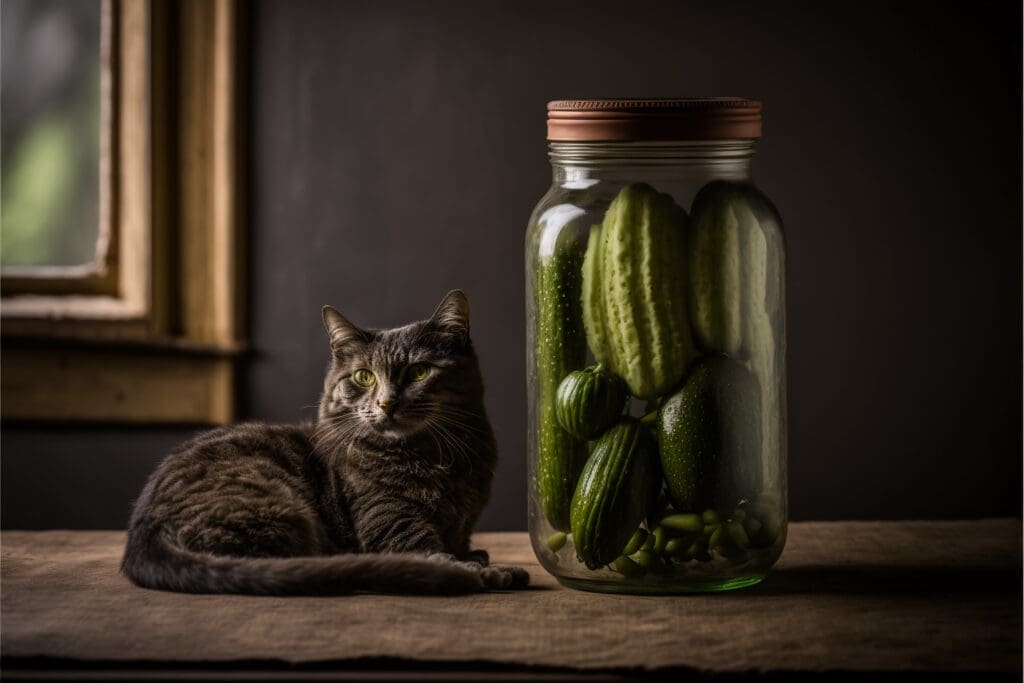Last Updated on January 25, 2023 by admin
No, cats should not eat pickles. Pickles contain too much salt, garlic, and other seasonings for cats, which can be dangerous for their health. Besides, the pickling liquid can also be harmful for cats. Treats like pickles are best kept away from cats and not shared at picnics or parties.
Overview of Pickles
Pickles are a type of cucumber that has been soaked in vinegar or brine and seasoned with salt, spices, and other flavorings. This combination creates a crisp, crunchy treat with a salty-sour taste. While pickles make a tasty addition to many human meals, cats should not eat them as they contain high levels of salt and seasonings like onion and garlic which can be toxic for cats.
Is Cucumber Safe for Cats?
Cucumbers themselves are not toxic to cats, so it’s safe to offer your cat freshly cut cucumber as a part of their diet. However, pickles are a totally different story. Pickles are cucumbers that have been pickled in salt and vinegar, and the excessive amounts of salt in them can be dangerous for cats. Additionally, many pickles also contain spices like garlic and onion, which can be toxic to cats. So while cats can safely eat cucumbers, it’s best to avoid giving them pickles altogether.
Are Pickles Unhealthy for Cats?
While the cucumber that pickles are made from isn’t poisonous to cats, pickles contain high levels of salt, seasonings such as garlic and onion, and pickling liquid that can be dangerous for our feline friends. The high salt content alone can cause dehydration, gastrointestinal upset, and even salt poisoning. Additionally, cats are very sensitive to garlic and onion, which can lead to anemia when consumed in large amounts. Therefore, it’s best to avoid feeding pickles to cats to avoid any potential illnesses.
The Risk of Seasonings and Pickling Liquid
The seasonings and pickling liquid used to make pickles can be dangerous for cats if ingested. Salt, vinegar, garlic, and other spices used in the pickling process can cause serious digestive issues for cats, such as vomiting and diarrhea. If a cat does consume pickles, it’s important to monitor them closely for any signs of distress. If any symptoms appear, consult your vet immediately. Moderation is key when feeding pickles to cats; a small amount can be fed on occasion as a treat, but it should not be part of their regular diet.
Moderation Is Key
When it comes to feeding your cat pickles, moderation is key. As mentioned, the high sodium content is the biggest risk associated with pickles. Cats cannot consume too much sodium, and this could lead to an increased risk of dehydration, electrolyte imbalance, and other health issues. Therefore, you should only feed your cat a few pieces of pickle in moderation. Additionally, you should pay attention to the seasoning and pickling liquid used to make the pickles as these may contain ingredients that cats may not be able to tolerate.
How to Feed Pickles to Cats
Though it is not recommended, cats can be fed pickles in moderation. The safest way to feed your cat pickles is to give them one or two thin slices of cucumber once a week, making sure to closely monitor their reaction. Be sure to remove any seasonings or pickling liquid, as these may contain harmful ingredients. When selecting cucumber slices, opt for organic and pesticide-free varieties, as these are the healthiest options. If your cat has difficulty digesting the cucumber slices, consider other safe alternatives that can provide your pet with health benefits.
Safe Alternatives to Pickles
Once you understand the risks associated with pickles, you may want to opt for safe alternatives to pickles that your cat can enjoy. Many cats love crunchy snacks, so you can try giving them treats like cooked and cubed sweet potatoes, green beans, or spinach. Just make sure they’re cooked thoroughly and not seasoned with any salt or other seasonings. If you want to give your cat something more special, you can try giving them some plain, canned tuna. If your cat loves popcorn, they can enjoy a few plain kernels as an occasional treat. However, it’s important to note that popcorn should not be salted or buttered as this can lead to health complications for your cat.
Conclusion
In conclusion, while a small amount of pickle may not cause immediate harm to a cat, it is not recommended to feed them this food on a regular basis since it contains potentially toxic ingredients. Moderation is key and cats should stick to their regular diet for optimal health. It is also important to keep in mind that pickles may contain spices, seasonings, and pickling liquid that can be harmful to cats if ingested in large quantities. If you are looking for a treat for your feline friend, there are more suitable snacks available.
